Emily Wurramara considers Tasmania to be her special “healing” place.
The 25-year-old musician, who was thrust into the global spotlight five years ago when her music was unearthed by Triple J, moved to the state from Queensland two years ago with her young daughter.
Wurramara had only visited Tasmania once before moving to the Southern Beaches region – and that was to meet her Tasmanian partner’s family – but she felt an instant connection with the state she now calls home.
“When I first came here, I fell in love with the place; I fell in love with its spirit,’’ the ARIA-nominated artist explains of Tasmania.
“Before I left Brisbane, I’d just lost everything in a house fire and I was a bit lost within myself. I just felt like I needed to escape out of Brisbane and escape from my familiarity and my comfort and just head somewhere where I felt uncomfortable and just deal with it. So I threw myself in the deep end, really; I needed to heal and the environment and the landscape of this place is incredible.
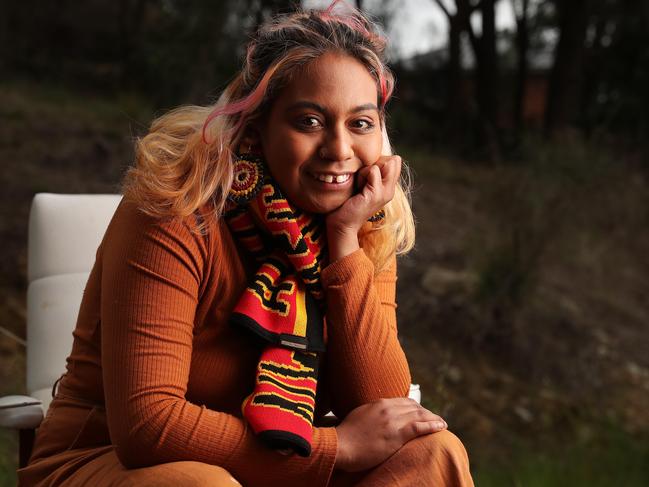
“You can walk outside and there’s nature everywhere … living in a city doesn’t afford you that privilege. But here I’m on country – in the bush and on the beach. I felt like I was a bit broken before I came here, as you are in different stages of your life; you get to points where you ask ‘what am I doing with my life?’’’
And although she feels Tasmania has afforded her some much-needed healing, that doesn’t mean Wurramara has been sitting idle since arriving here.
Despite the coronavirus pandemic cancelling many major music festivals and gigs over the past 18 months or so, Wurramara has continued to make music, albeit in a different way.
She recently signed with record label ABC Music and is now working on her new album, which is due out next year. But she has also been performing various online gigs and online workshops, as well as hosting in-person workshops in Hobart through Indigenous social enterprise Nayri Niara.
“I’m pretty happy just helping and teaching people right now; it feels like I’m learning as well when I’m talking to other artists. I’m constantly learning, it’s really beautiful,’’ says
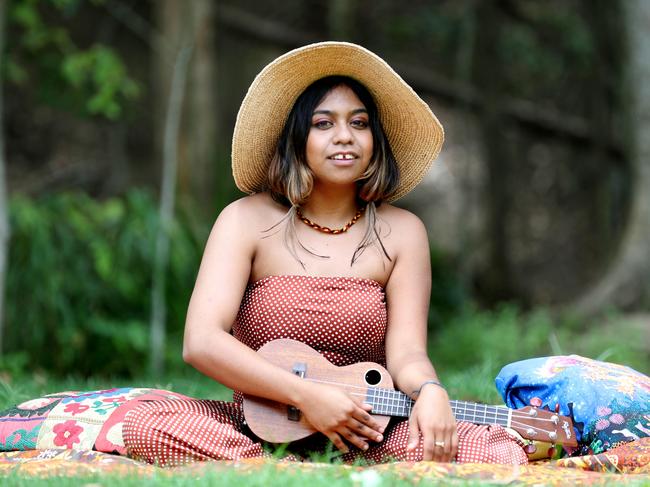
Wurramara, who has more than 24,000 followers on Instagram and is also active on Facebook, YouTube and Patreon.
She’s also preparing to tour Australia with iconic Aussie band Icehouse between February and May next year and is also part of the SummerSalt concert line-up – along with performers like Missy Higgins, John Butler, The Teskey Brothers, Xavier Rudd, Birds of Tokyo, Pete Murray and The Waifs – with a string of concerts across Australia in early 2022. There’s a SummerSalt show at the Royal Tasmanian Botanical Gardens on Sunday February 6, although Wurramara has not yet been confirmed as part of the line-up.
Wurramara is also working on a song with The Wiggles for their 30th anniversary, while also creating music for ABC Kids.
The proud First Nations artist, whose songs include a mix of English and Anindilyakwa lyrics, has been in hot demand since her music captured the attention of radio listeners in 2016.
She has been described as “one of music’s most inspiring Indigenous role models” and “beyond her years in spirit and talent”.
Wurramara has toured and played with iconic artists including Archie Roach, Mavis Staples, John Farnham, Coloured Stone, Missy Higgins, Jessica Mauboy, Cat Empire and John Butler, just to name a few.
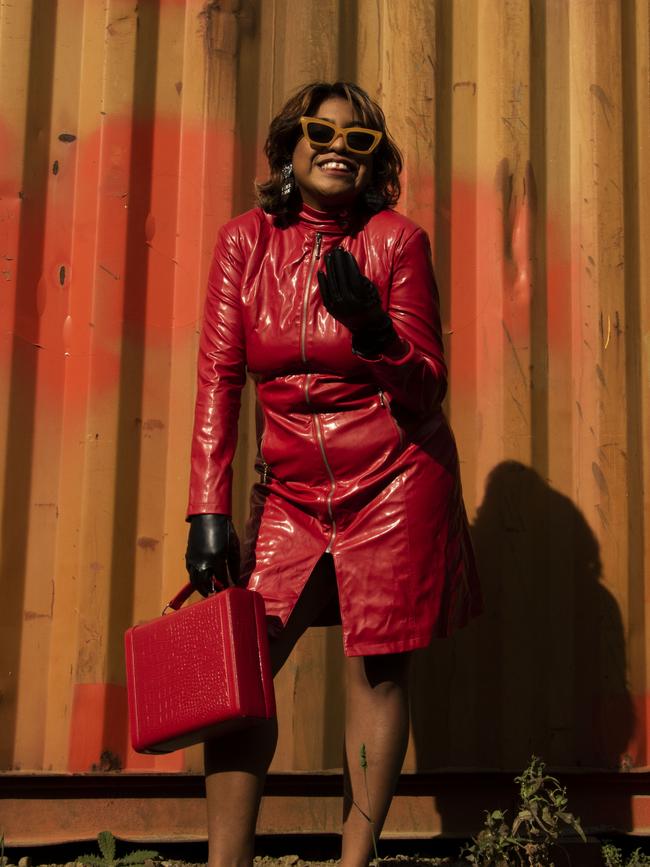
She has performed on global stages, including at the Woodford Folk Festival, Bluesfest, TEDX Sydney, GARMA, BIGSOUND and International Folk Alliance showcases in Kansas, Canada and New Orleans, as well as shows in Chicago, New York and Paris.
Songs from her 11-track critically acclaimed album Milyakburra, released in 2018, are on high rotation on Triple J and ABC Local, while she also has a strong following on Spotify, with her song Lady Blue amassing more than 7 million Spotify streams.
She is a six-time Queensland Music Award winner and was named Breakthrough Independent Artist and won Best Independent Blues and Roots Album in the 2019 AIR (Australian Independent Record) awards.
Most recently, she was awarded a $10,000 grant as part of Isol-Aid Homegrown, a program providing creative and financial support to emerging bands and musicians across Australia and New Zealand.
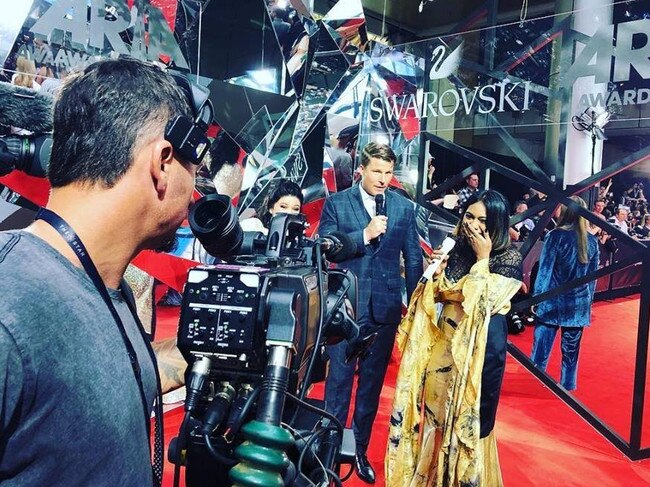
From almost 1000 nominations, 25 emerging acts were chosen to receive $2000 worth of design work from 99designs by Vistaprint, while Wurramara was awarded $10,000 to put towards furthering her music career. She will also receive a dedicated mentoring session with Australian musician and TV/radio presenter Ella Hooper (formerly of Killing Heidi).
Like most musicians, the past 18 months took a toll on Wurramara’s creativity, mental health and career prospects.
“When everything came to a stop, I lost myself and wondered if it was worth it anymore,’’ she says.
“I almost gave up music, but I’m grateful to have found myself again and reignited my passion and appreciation for music.”
She felt humbled to receive the award, particularly given the high calibre of nominees.
“I won it and I was really surprised, as I was up against some really amazing bands,’’ Wurramara says.

She says the timing of the award was perfect, as she is preparing to launch her new album.
“This album will be the beginning of a new me – a true representation of me as an artist and person,’’ Wurramara says. “This grant will help provide the resources necessary to bring my voice to the forefront at home and abroad.
“It’s $10,000 to go towards anything I want to help hone my craft and bring my story to light and go towards merchandise and whatnot. It really helps a lot, considering the year it has been for the arts industry and musicians. I feel honoured to receive it – it is going to help a lot with my vision and what I want to achieve and what I want to say.’’
Wurramara spent her childhood in a remote part of the Northern Territory going “back and forth between two little islands in the Gulf of Carpentaria” – Groote Eylandt and Bickerton Island.
Her mother – a Warninidlyakwa woman who also has Greek, Italian and Turkish heritage – grew up on the islands, while her father grew up in Negros in the Philippines and has Filipino, Chinese and Spanish heritage.
The family moved to Brisbane when Wurramara was six, but returned to the islands regularly to visit extended family.

Wurramara loved books and poetry as a child, and this eventually led her to music.
She wrote her first song at age seven, called Over the Seas – a tale of mermaids, dolphins and dugongs swimming in the ocean – and says from a young age, she discovered the power of music for sharing stories and connecting people emotionally.
“Songwriting, for me, started when I was very young and I just kind of went with it,’’ says Wurramara, who realised she could sing after doing karaoke sessions with her family and being praised by teachers who heard her sing in school choirs.
“I found it was a safe way for me to express my emotions.’
“When we moved from Groote to Brisbane, I really missed home, and writing music and playing instruments was my comfort.’’
She learnt to play violin in year 3, then the saxophone.
“It kind of went from there,’’ explains Wurramara, who can now also play piano, ukulele, guitar and drums.
“When I turned 13 or 14, I knew I wanted to do it more seriously as a career.’’
She started doing community workshops and connected with other creatives, including musicians, artists, videographers, photographers and sound engineers.
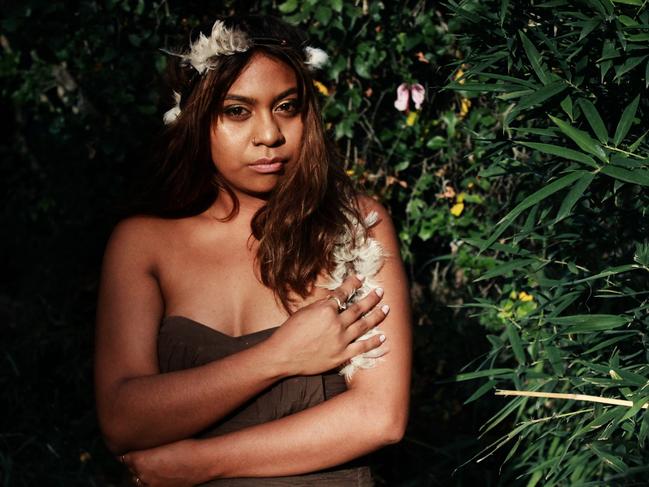
When she turned 18, she was selected to participate in Clancestry, collaborating with Powderfinger’s Bernard Fanning in Brisbane in 2014.
And it was this collaboration that led to her first single, Ngerraberrakernama.
“That was the point when I knew music was definitely what I wanted to do as a career,’’ Wurramara says.
She debuted her Black Smoke EP in 2016, which attracted the attention of Triple J Unearthed and launched her music onto the airwaves. And listeners sat up and took notice.
“I just started doing music and everyone seems to love my music,’’ Wurramara says.
“I’ve been meeting amazing people and going to amazing places; I feel very lucky and privileged to be doing what I’m doing.”
Growing up, she recalls there were only a handful of Indigenous musicians to look up to.
“I could name probably four mainstream First Nations artists who I heard on the radio a lot – my grandparents had Coloured Stone and Yothu Yindi on cassette,’’ Wurramara recalls.
“Now we have playlists on Spotify, YouTube, awards, representation in the mainstream radio, media, TV. It makes me so insanely proud … it’s so empowering and inspiring. We’ve come a long way but we still have a long way to go.”
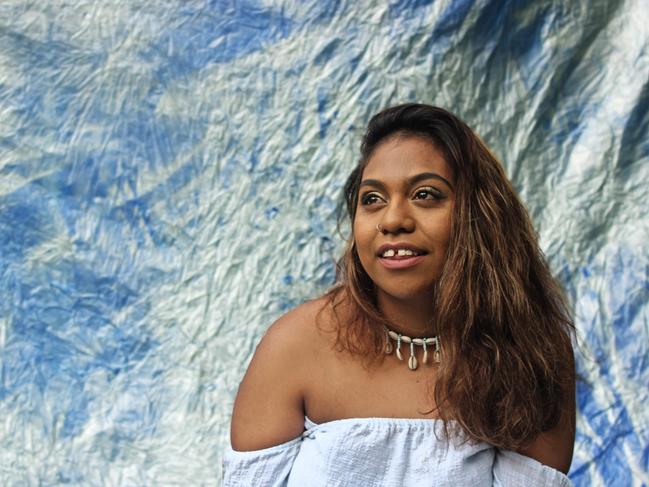
She says it felt natural to bring two languages together in her music.
“Not a lot of young women sing in an Indigenous language,’’ Wurramara says.
“I wanted young ones back in my community to hear my language on the radio and I was like ‘if anyone is going to do this, I should do it, because no one else is doing this’.
“Singing in language is a way of connecting, of sharing stories of my grandparents.
“It’s a way of shining light on issues that still happen to First Nations people in society and also creating awareness that there are Aboriginal people here and there are Aboriginal communities who still speak their language and are still thriving.
“It is really hard sometimes, because I do feel very tokenised in different aspects. But knowing three generations ago, my great grandmother would not have been able to do this, it really empowers me and I want to give it my all. It’s a legacy, and a legacy I’m leaving for my daughter, which makes it even more special.’’
Her daughter K’iigari – or Kiki for short – turns four next month and Wurramara says she is the inspiration for everything she does.
“She’s my driving force,’’ Wurramara says of her “baby” who starts “big school” (kindergarten) next year. “When I do music and when I write and sing music, I kind of have her in the back of my head. Like, she’s going to hear this one day and what’s she going to think about it? Whether it’s inspirational or truthful or sad, music embodies more than just stories. It embodies people’s soul and I feel like I’m leaving little bits of my soul for her to listen to one day when I’m gone.’’
Wurramara says the pandemic has meant she does a lot of work from home, which means K’iigari can watch her mum work.
“It’s pretty easy with her, because she loves what I do – she loves music and we do that together,’’ Wurramara says. “But she’s also aware that this is my job – I feel like she has a sixth sense and she knows when to just sit back quietly. And she loves being part of that, she loves sitting there listening.’’
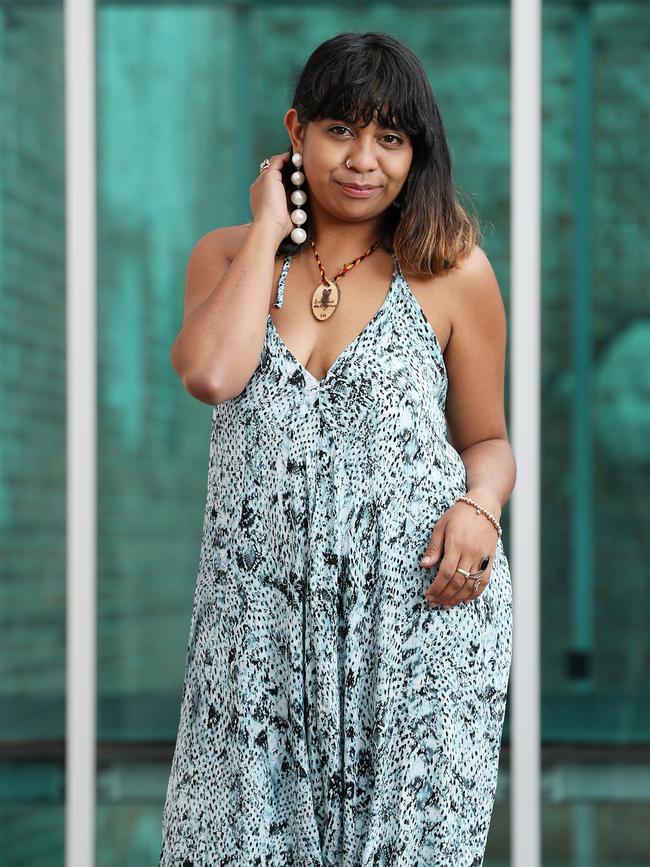
Prior to Covid, Wurramara took her daughter on tour. She says she is grateful for family support – from her mum in Brisbane to her partner, teacher’s assistant Kai Mason, and his extended family in Tasmania – for helping her to juggle parenthood and a music career.
“She’s very, very loved,’’ Wurramara says of her daughter.
“We try and speak in language as much as possible. It’s important for her to hear language and to know her roots and her heritage.’'
Wurramara says an unusual string of events led her to meet her partner almost three years ago, and they started a life together in Tasmania.
“It’s actually a funny story,’’ she says.
“My partner’s mum helps run a festival here – Nayri Niara. And my friend [singer-songwriter Kelsey Barker] was performing here almost three years ago. My partner is her cousin. And I saw a photo of them together and I said ‘Who is he? He’s lovely! Give him my phone number’.’’
So that’s exactly what Barker did.
“He contacted me, he texted me. I thought ‘oh my gosh, he actually texted’,’’ Wurramara says.
“Then we met in Melbourne maybe three months after and we hung out.
“And six months later, we started dating. I met his family and I moved down here.
“And I love it here, it’s so beautiful … I feel very lucky. I don’t have any family here, I don’t know anyone except my in-laws.
“I threw myself in the deep end and just went for it. And I’m really glad I did … I think I’ve grown a lot since I’ve been here. It’s a bit of a safe place for me … I reckon I’m going to be here for a while.’’
Wurramara says when she first arrived in Tasmania, she was careful to respect local customs and traditions, and spent some time with Indigenous Tasmanians in putalina (Oyster Cove).
“When I moved here, I didn’t really want to perform or do anything until I met the mob first and had a proper welcome to country,’’ she says.
“This isn’t my country, I’m a guest on this country, so it’s really important for me, wherever I go to be introduced.’’
Wurramara has enjoyed learning more about Aboriginal culture in Tasmania, being introduced to places that are considered sacred and exploring various walking trails.
She was heartened to see that Tasmania uses dual place names, with monikers like kunanyi (Mt Wellington), takayna (The Tarkine), nipaluna (Hobart) and lutruwita (Tasmania) now a common part of the Tasmanian vernacular.
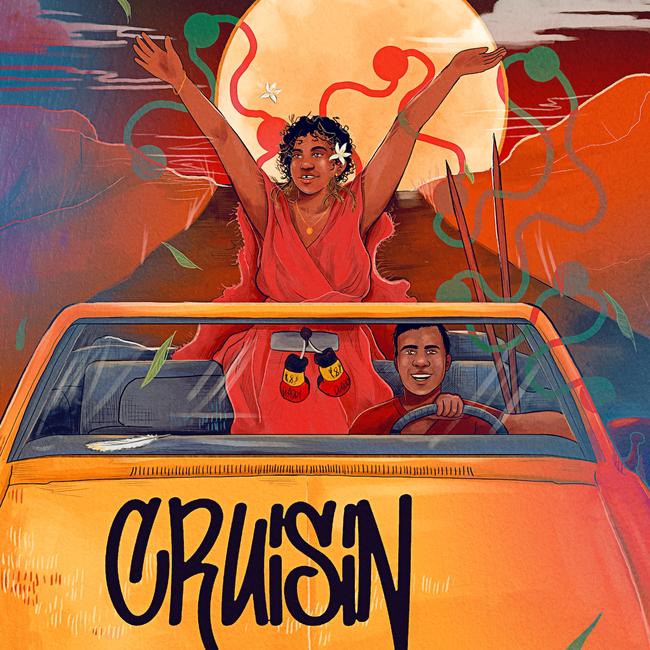
“It made me really proud,’’ Wurramara confesses of seeing dual names on road signs when she arrived in Hobart. “It’s like ‘man, this is so cool to see – it’s awesome to see’. It’s awesome that my daughter gets to grow up in this place and be around this.’’
She says Tasmania is also a beautiful place to help inspire her songwriting.
“My songwriting comes from a place I don’t really understand yet,’’ Wurramara confesses.
“But when a song comes to me, I get this ethereal, weird ascending feeling like I’ve watched a sunrise with fog rolling over the hills. I get chills.
“To me, songwriting is like a ceremony, it’s sacred. It allows connection to happen not to the physical but to the soul, to the spirit.’’
And she says even after all this time, the chills still come.
“I’ll be sitting there and some melody will come up, and I’ll think ‘that’s actually really good’ and I’ll get a guitar and jam it out or just press record on my phone and sing what I’m feeling. And then I’ll go back and listen and figure out the words.
“It’s a process, it doesn’t happen straight away, but when it happens, it’s just the most magical thing ever. I don’t really know how to explain it other than it’s just really enchanting.’’ ■

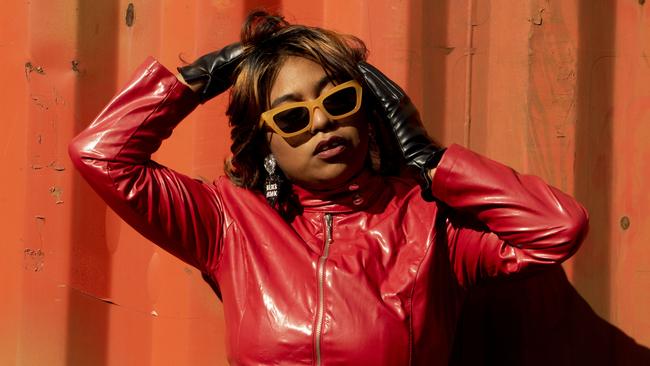
Add your comment to this story
To join the conversation, please log in. Don't have an account? Register
Join the conversation, you are commenting as Logout
Yunnan’s soul served in every dish
At Schole, Food Culture’s Lyla Zhu and Mitch Alomes dish up the bold, tempting flavours of Yunnan in intimate Sunday lunches, writes Alix Davis
Passionate Tassie adventurer embraces epic challenges
Adventurer, environmental economist and all-round go-getter – Tassie’s Tim Harmsen is on a mission to revive one of Tasmania’s toughest winter races... while also adding a quirky new twist